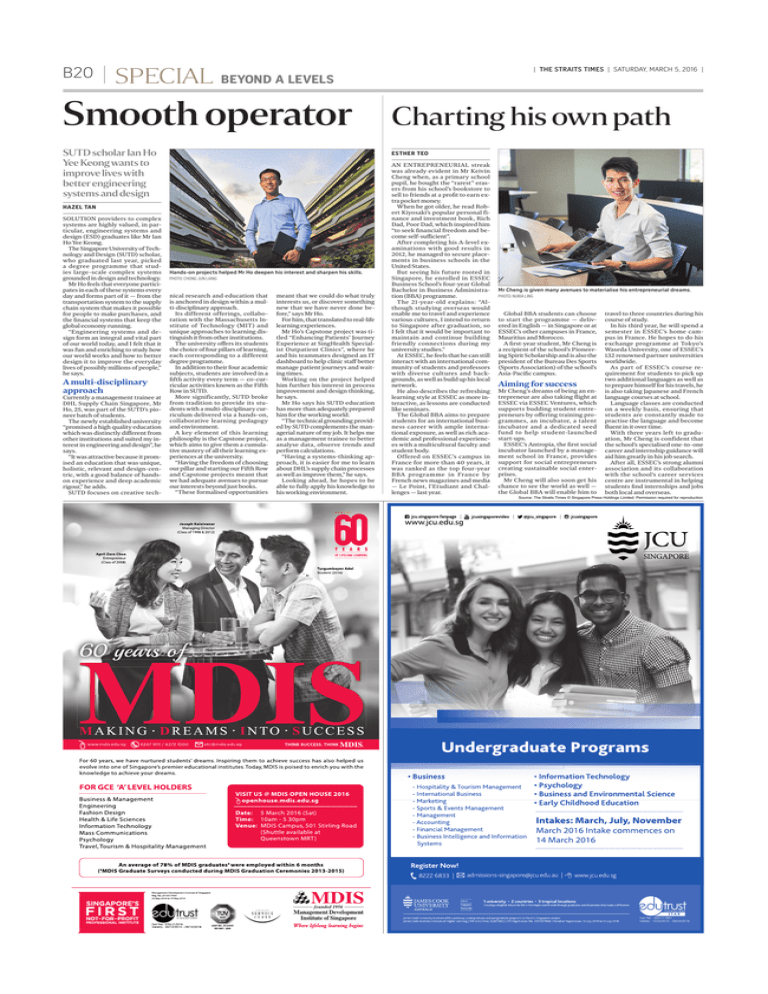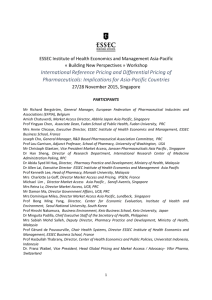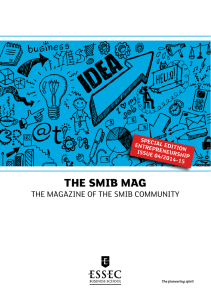Smooth operator Charting his own path SPECIAL B20
advertisement

B20 SPECIAL BEYOND A LEVELS Smooth operator SUTD scholar Ian Ho Yee Keong wants to improve lives with better engineering systems and design A multi-disciplinary approach Currently a management trainee at DHL Supply Chain Singapore, Mr Ho, 25, was part of the SUTD’s pio neer batch of students. The newly established university “promised a high quality education which was distinctly different from other institutions and suited my interest in engineering and design”, he says. “It was attractive because it promised an education that was unique, holistic, relevant and design-centric, with a good balance of handson experience and deep academic rigour,” he adds. SUTD focuses on creative tech- Charting his own path ESTHER TEO HAZEL TAN SOLUTION providers to complex systems are highly valued, in particular, engineering systems and design (ESD) graduates like Mr Ian Ho Yee Keong. The Singapore University of Technology and Design (SUTD) scholar, who graduated last year, picked a degree programme that stud ies large-scale complex systems grounded in design and technology. Mr Ho feels that everyone participates in each of these systems every day and forms part of it — from the transportation system to the supply chain system that makes it possible for people to make purchases, and the financial systems that keep the global economy running. “Engineering systems and design form an integral and vital part of our world today, and I felt that it was fun and enriching to study how our world works and how to better design it to improve the everyday lives of possibly millions of people,” he says. | THE STRAITS TIMES | SATURDAY, MARCH 5, 2016 | Hands-on projects helped Mr Ho deepen his interest and sharpen his skills. PHOTO: CHONG JUN LIANG nical research and education that is anchored in design within a multi-disciplinary approach. Its different offerings, collaboration with the Massachusetts Institute of Technology (MIT) and unique approaches to learning distinguish it from other institutions. The university offers its students the choice of four pillars of learning, each corresponding to a different degree programme. In addition to their four academic subjects, students are involved in a fifth activity every term — co-curricular activities known as the Fifth Row in SUTD. More significantly, SUTD broke from tradition to provide its students with a multi-disciplinary curriculum delivered via a hands-on, collaborative learning pedagogy and environment. A key element of this learning philosophy is the Capstone project, which aims to give them a cumulative mastery of all their learning experiences at the university. “Having the freedom of choosing our pillar and starting our Fifth Row and Capstone projects meant that we had adequate avenues to pursue our interests beyond just books. “These formalised opportunities meant that we could do what truly interests us, or discover something new that we have never done before,” says Mr Ho. For him, that translated to real-life learning experiences. Mr Ho’s Capstone project was titled “Enhancing Patients’ Journey Experience at SingHealth Specialist Outpatient Clinics”, where he and his teammates designed an IT dashboard to help clinic staff better manage patient journeys and waiting times. Working on the project helped him further his interest in process improvement and design thinking, he says. Mr Ho says his SUTD education has more than adequately prepared him for the working world. “The technical grounding provided by SUTD complements the managerial nature of my job. It helps me as a management trainee to better analyse data, observe trends and perform calculations. “Having a systems-thinking approach, it is easier for me to learn about DHL’s supply chain processes as well as improve them,” he says. Looking ahead, he hopes to be able to fully apply his knowledge to his working environment. AN ENTREPRENEURIAL streak was already evident in Mr Keivin Cheng when, as a primary school pupil, he bought the “rarest” erasers from his school’s bookstore to sell to friends at a profit to earn extra pocket money. When he got older, he read Robert Kiyosaki’s popular personal finance and investment book, Rich Dad, Poor Dad, which inspired him “to seek financial freedom and become self-sufficient”. After completing his A-level examinations with good results in 2012, he managed to secure placements in business schools in the United States. But seeing his future rooted in Singapore, he enrolled in ESSEC Business School’s four-year Global Bachelor in Business Administration (BBA) programme. The 21-year-old explains: “Although studying overseas would enable me to travel and experience various cultures, I intend to return to Singapore after graduation, so I felt that it would be important to maintain and continue building friendly connections during my university studies.” At ESSEC, he feels that he can still interact with an international community of students and professors with diverse cultures and backgrounds, as well as build up his local network. He also describes the refreshing learning style at ESSEC as more interactive, as lessons are conducted like seminars. The Global BBA aims to prepare students for an international business career with ample international exposure, as well as rich academic and professional experiences with a multicultural faculty and student body. Offered on ESSEC’s campus in France for more than 40 years, it was ranked as the top four-year BBA programme in France by French news magazines and media — Le Point, l’Etudiant and Challenges — last year. Mr Cheng is given many avenues to materialise his entrepreneurial dreams. PHOTO: NURIA LING Global BBA students can choose to start the programme — delivered in English — in Singapore or at ESSEC’s other campuses in France, Mauritius and Morocco. A first-year student, Mr Cheng is a recipient of the school’s Pioneering Spirit Scholarship and is also the president of the Bureau Des Sports (Sports Association) of the school’s Asia-Pacific campus. Aiming for success Mr Cheng’s dreams of being an entrepreneur are also taking flight at ESSEC via ESSEC Ventures, which supports budding student entrepreneurs by offering training programmes, an incubator, a talent incubator and a dedicated seed fund to help student-launched start-ups. ESSEC’s Antropia, the first social incubator launched by a management school in France, provides support for social entrepreneurs creating sustainable social enterprises. Mr Cheng will also soon get his chance to see the world as well — the Global BBA will enable him to travel to three countries during his course of study. In his third year, he will spend a semester in ESSEC’s home campus in France. He hopes to do his exchange programme at Tokyo’s Waseda University, one of ESSEC’s 132 renowned partner universities worldwide. As part of ESSEC’s course re quirement for students to pick up two additional languages as well as to prepare himself for his travels, he is also taking Japanese and French language courses at school. Language classes are conducted on a weekly basis, ensuring that students are constantly made to practise the language and become fluent in it over time. With three years left to gradu ation, Mr Cheng is confident that the school’s specialised one-to-one career and internship guidance will aid him greatly in his job search. After all, ESSEC’s strong alumni association and its collaboration with the school’s career services centre are instrumental in helping students find internships and jobs both local and overseas. Source: The Straits Times © Singapore Press Holdings Limited. Permission required for reproduction


